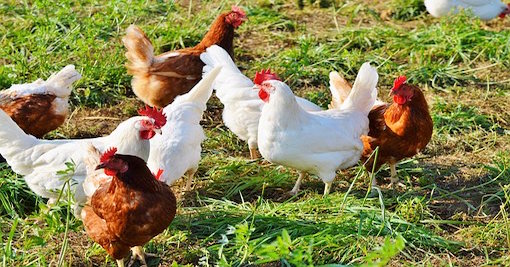
That Organic Chicken On Your Plate: Did It Really Get To Walk Around Outside?
At the last minute, the Obama administration elevated standards for organic meat. Trump's USDA has managed to delay them for eight months so far, and the outlook isn't bright.
While rules established in the twilight of the Obama administration would make life nicer for chickens raised organically — giving them more elbow room and time in the sun — the Trump administration has delayed implementation of these rules, perhaps indefinitely. And so the Organic Trade Association — the industry's lobbying group — has taken the USDA to court, seeking to force the agency to put the rules in place by Nov. 14.
November 3, 2017 | Source: BuzzFeed News | by Venessa Wong
What does it mean to be an organic chicken?
The US Department of Agriculture and organic food advocates are locked in a fierce battle over just what “organic” means, specifically with regard to poultry welfare. How much living space should organic chickens be entitled to? How much access should they have to the outdoors?
While rules established in the twilight of the Obama administration would make life nicer for chickens raised organically — giving them more elbow room and time in the sun — the Trump administration has delayed implementation of these rules, perhaps indefinitely. And so the Organic Trade Association — the industry’s lobbying group — has taken the USDA to court, seeking to force the agency to put the rules in place by Nov. 14.
A lot is at stake — and not just for the millions of birds involved. Chicken and egg producers say the new requirements would be far too expensive to implement, forcing some of them out of the organic business and reducing the overall supply available to consumers.
But animal rights groups and organic food advocates — who celebrated the arrival of the new rules and bemoaned that they didn’t go far enough — say that the “organic” label implies a certain standard of living for animals. And if consumers think that standard isn’t high enough, they could ultimately decide that buying organic just isn’t worth it.
“That USDA organic seal needs to mean something to the consumer, and it needs to be significantly different from the alternatives, because people are paying more for organic products,” Laura Batcha, CEO of the Organic Trade Association.
Without stricter rules, she and her members fear, “organic” eventually won’t mean much at all to consumers. “We’re looking forward to a judge weighing in,” she said.
On the other side of the dispute is the National Chicken Council, a trade group for chicken farmers that is deeply concerned about the burden the rules would place on its members.
“Fundamentally, NCC is concerned that the proposed rule imposes unreasonable costs and requirements of doubtful benefit on organic farmers, presents grave risks to animal health in the face of an avian disease outbreak, and undermines ongoing international efforts to develop poultry welfare standards,” the National Chicken Council wrote in a letter last year to the National Organic Program.
Another trade group, United Egg Producers, urged the USDA to withdraw the rules. “Farmers have made major capital investments in buildings, land and other assets, relying on USDA’s previous” definition of organic, it said in a letter to the agency in June.
When it comes to organic meat, chicken is king. In 2016, sales of organic chicken (the most widely sold organic meat) shot up by 78% to $750 million and organic egg sales jumped by 11% $816 million. The poultry company Perdue acquired organic chicken producer Coleman Natural Foods in 2011.
Tyson Foods said earlier this year that the company would introduce organic chicken in July. “Organic is a very small space today, but it is growing,” said Tyson’s CEO, Tom Hayes, said at the time.
